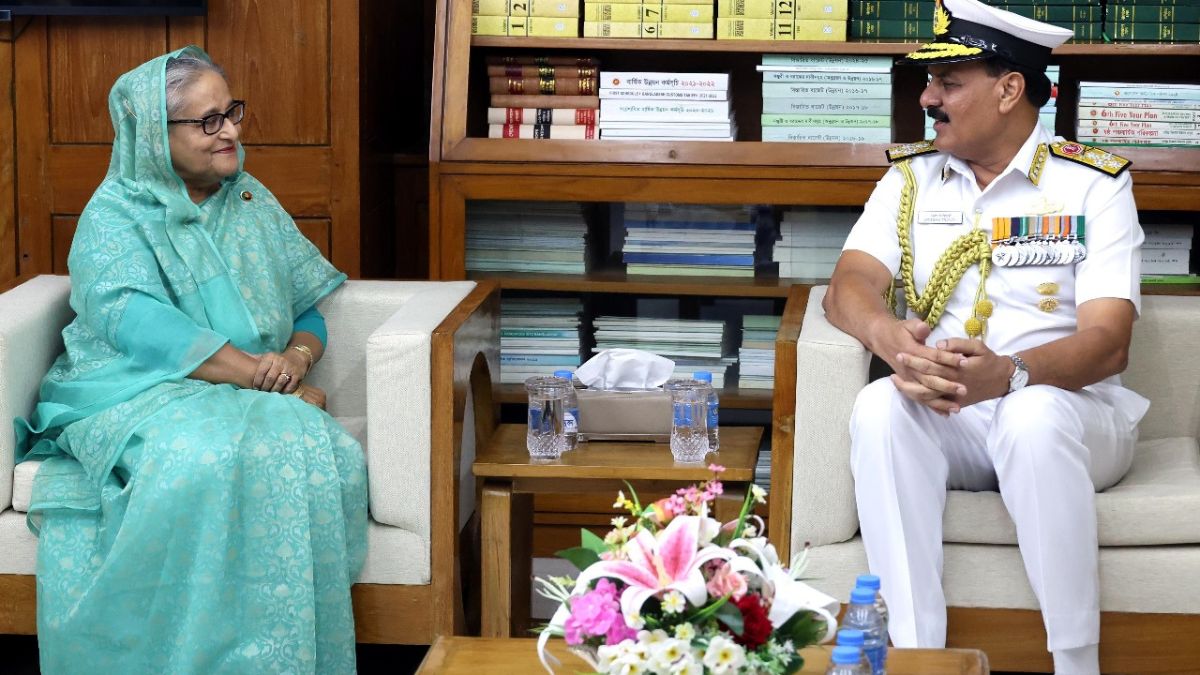Admiral Dinesh K Tripathi, Chief of the Naval Staff (CNS) of the Indian Navy, is in Bangladesh on his maiden foreign visit. The four-day trip from July 1 holds great strategic and symbolic importance for the two countries.
The trip also serves the broad dimensions of India's defence and foreign policy, particularly in the context of the SAGAR vision, Neighbourhood First diplomacy, Act East Policy, and the Make-in-India and Make For World initiatives.
Strengthening Defence Ties
The timing of Tripathi's visit is pertinent for many reasons. The visit comes just ahead of Prime Minister Sheikh Hasina's scheduled trip to China– a nation trying quite hard to pull Bangladesh away from India’s circle of influence and into its own. With the CNS’ visit, New Delhi has gained the first mover’s advantage this round.
During his visit, Adm. Tripathi engaged in high-level discussions with PM Sheikh Hasina. She expressed her profound appreciation for India's support during Bangladesh's War of Liberation from Pakistan in 1971. The Navy had a big role to play in helping Dhaka during the Liberation War. That conversation did two things: it brought to the fore how New Delhi had been on Dhaka’s side in an hour of need and subtly showed the benefit of defence collaboration between the neighbours.
Adm. Tripathi's review of the Passing Out Parade (POP) at the Bangladesh Naval Academy (BNA) in Chittagong is another highlight. Meeting with his counterpart, Adm. M Nazmul Hassan, Chief of the Naval Staff of Bangladesh, and other top military and security officials like Major General Tarique Ahmed Siddique (Retd), Security Advisor to Prime Minister of Bangladesh, are significant aspects of this visit. Discussions here pressed on bolstering bilateral defence relations and exploring new avenues for naval cooperation.
Embodiment of National Strategic Vision
The significance of this visit is also visible in clearly communicating the core tenets of India's strategic vision as articulated through several key initiatives:
SAGAR Vision: The Security and Growth for All in the Region (SAGAR) initiative has laid extensive focus on regional cooperation and maritime security. Adm. Tripathi's engagements in Bangladesh spotlight India's role in achieving precisely this in the Indian Ocean Region (IOR).
Neighbourhood First Policy: As part of the Neighbourhood First policy, India has been enhancing its engagement—economically, through joint military exercises, and diplomatically—with nations in the region. A top Indian military official’s in-depth engagement with Bangladesh is yet another part of these continuous efforts.
Act East Policy: This visit reinforces India's strategy to deepen engagement with Southeast and East Asia through enhanced connectivity and cooperation.
Make-in-India and Make For World: A landmark achievement of Adm. Tripathi's visit was the signing of a defence contract between the Bangladesh Navy and India's Garden Reach Shipbuilders and Engineers (GRSE) for an 800-tonne ocean-going tug. Valued at approximately $21 million, this contract is part of a $500-million line of credit extended by India to Bangladesh for defence procurement. The deal for a world-class made-in-India vessel exemplifies India's growing role as a defence exporter.
Detailed Interactions of Admiral Dinesh K Tripathi
Adm. Tripathi's itinerary in Bangladesh has been meticulously planned to maximise strategic and diplomatic engagement. His aim was to consolidate India-Bangladesh bilateral defence relations and explore new avenues for naval cooperation.
Paying tribute to the Bravehearts of the Bangladesh Armed Forces at the Shikha Anirban (eternal flame) in Dhaka, as well as visiting the National Defence College (NDC) in Bangladesh, was important from the symbolic viewpoint. The meeting and discussions with Adm. M Nazmul Hassan, calling on Prime Minister Sheikh Hasina, and giving an overview of geopolitical trends and the security environment in the Indo-Pacific Region at NDC were pragmatic, diplomatically productive events.
Future Prospects and Regional Stability
Adm. Tripathi's visit reaffirms the strong geopolitical and strategic ties between India and Bangladesh, demonstrating that despite external influences (read: China), the bilateral relationship remains a priority for both nations. The discussions also touched upon future collaborations in defence and energy, focusing on ensuring the region's peace, stability, and security. As Prime Minister Sheikh Hasina prepares for her visit to China, the outcomes of Admiral Tripathi's visit to Bangladesh will undoubtedly play a big role in shaping the future of Indo-Bangladeshi relations in the face of evolving geopolitical dynamics.


